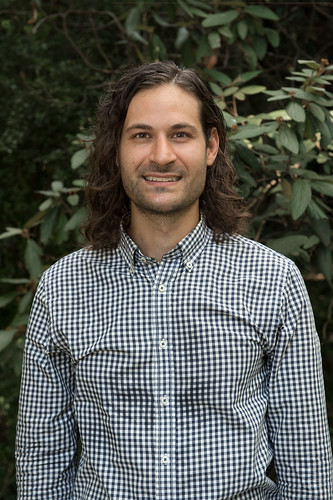ESA Announces 2017 Graduate Student Policy Award Recipients
The Ecological Society of America (ESA) is pleased to announce the winners of this year’s Graduate Student Policy Award (GSPA). This award provides graduate students with the opportunity to travel to Washington, DC for policy experience and training. Six recipients were selected for this year’s award: Jason M. Aloisio (Fordham University), Tyler C. Coverdale (Princeton University), Anna M. Groves (Michigan State University), Christine J. Pardo (University of Miami), Jessica M. Rudnick (University of California, Davis), and Benton N. Taylor (Columbia University).
These students will travel to DC later in April to learn about the legislative process and federal science funding, to hear from ecologists working in federal agencies, and to participate in Congressional Visits Day, when they will meet with policymakers on Capitol Hill. This event, co-organized by ESA and sponsored by the Biological and Ecological Sciences Coalition, offers GSPA recipients the chance to interact with their members of Congress and discuss the importance of federal funding for the biological and ecological sciences.
“By training ESA members to effectively communicate science to lawmakers, we can bridge the gap between science and policy and help fill the critical need for science-informed policy decisions. This valuable, hands-on experience provides these young ecologists with essential science communication skills that will enable them to successfully engage in the policy realm,” said Katherine McCarter, executive director of ESA.
2017 ESA Graduate Student Policy Award Recipients
Jason M. Aloisio
Jason Aloisio is experienced in connecting the scientific community to the broader public and has worked extensively to communicate about ecology to diverse communities. In pursuit of his Ph.D. at Fordham University, he focused on the ecology of green roof ecosystems. He has worked for the Wildlife Conservation Society since 2011, where he co-developed and now runs Project TRUE (Teens Researching Urban Ecology), an urban ecology research immersion program supported by NSF. Each summer, he manages a research team of high school students to help introduce them to the urban ecology of NYC. He serves as the secretary and web administrator of ESA’s Urban Ecosystem Ecology Section.
Tyler C. Coverdale
Tyler Coverdale is pursuing his Ph.D. in ecology and evolutionary biology at Princeton University, focusing on community ecology and conservation. His current research in Kenya, partly funded by a grant from the National Science Foundation, focuses on plant defenses in African savannas. He has also worked at Gorongosa National Park in Mozambique, where he focused on restoring the Park’s vegetation community, an experience that offered opportunities for communicating scientific work and translating research into policy change. In 2015, he co-organized a science communication symposium at Princeton that focused on effective methods for communicating science to the public and to policymakers.
Anna M. Groves
Anna Groves is a Ph.D. candidate in the Ecology, Evolutionary Biology, and Behavior (EEBB) program and Department of Plant Biology at Michigan State University. She studies prairie restoration ecology and plant community assembly, focusing on tallgrass prairie restoration. She is the recipient of a National Science Foundation Graduate Research Fellowship, and she has experience in science communication through blogging, teaching, and speaking to the public. She is the co-founder and president of the EEBB Graduate Student Organization and serves as the secretary of ESA’s Student Section.
Christine J. Pardo
Christine Pardo is pursuing her Ph.D. in Environmental Science and Policy at the University of Miami. Her research focuses on invasive plant species and aims to help local management agencies better predict and control the effects of species invasions in South Florida. After receiving her undergraduate degree, she worked as a biologist with the Division of Environmental Resource Management of Miami-Dade County, where she enforced environmental policy and assessed environmental resources. She is the founder and served as the president of G.L.A.D.E.S., an ESA SEEDS Chapter at Florida International University.
Jessica M. Rudnick
Jessica Rudnick is in the second year of her Ph.D. work in the Graduate Group in Ecology at the University of California, Davis. Her research interests focus on agroecological systems, climate-agriculture adaptation, and the development of agro-environmental policy, with a focus on farming communities in California that are at high risk of climate change impacts. She has been working at the intersection of scientific research and policy at the California Department of Food and Agriculture, where she currently serves as a research fellow analyzing policy tools to support adaptation and building resilience in California’s food system. She is a co-founder of Science Informed Leadership, a graduate student-led effort to promote science leadership in the executive branch, and has served as its Science Advocacy Group Coordinator
Benton N. Taylor
Benton Taylor is pursuing his Ph.D. at Columbia University in the Department of Ecology, Evolution, and Environmental Biology, where his current research focuses on tropical forests and how nitrogen-fixing trees fuel forest regeneration after human land use. His interest in seeing ecological research shape government policy has driven many of the questions that he asks as an ecologist, working to understand the role that forests will play in shaping the future atmosphere. He previously worked at the Department of Energy-funded Free-Air-CO2-Enrichment experiment in North Carolina and at La Selva Biological Station in Costa Rica, where he served as an NSF Research Experiences for Undergraduates mentor.
###
The Ecological Society of America, founded in 1915, is the world’s largest community of professional ecologists and a trusted source of ecological knowledge, committed to advancing the understanding of life on Earth. The 10,000 member Society publishes five journals and a membership bulletin and broadly shares ecological information through policy, media outreach, and education initiatives. The Society’s Annual Meeting attracts 4,000 attendees and features the most recent advances in ecological science. Visit the ESA website at https://esa.org.
